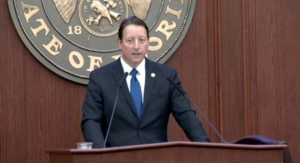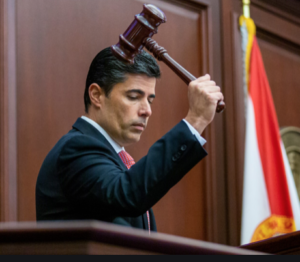By John Haughey
The Center Square
January 16, 2020

Sixty-seven committees and subcommittees, 156 lawmakers in two legislative chambers, 3,382 proposed bills and $91-plus billion in proposed spending – it’s going to be a busy 60 days in Tallahassee.
The Florida Legislature officially convened Tuesday after Gov. Ron DeSantis commissioned lawmakers to “seize the moment” and “deliver for the people of Florida” before the 2020 legislative session ends on March 13.
On the agenda is many agendas: Teacher pay, environmental spending, healthcare, criminal justice reform, abortion restrictions, nearly 100 firearms related bills, E-Verify, climate change, proposed toll road expansions, preemption, school choice, workforce education, emergency planning, elections security and so on.
But make no mistake, regardless the agendas, the common theme will be conservative with Republicans holding 23-17 Senate and 73-43 House advantages.
The Senate convened on a solemn note, commemorating the Dec. 6 fatal shooting of three U.S. Navy sailors – designated a terrorist attack last week by U.S. Attorney General William Barr – at Pensacola Naval Air Station by a Saudi Air Force officer.
In his ensuing opening remarks, Senate President Bill Galvano, R-Bradenton, reiterated what has become a theme for him in calling for lawmakers to respect and work with each other in conducting the people’s business.
“As we go into this session, let us continue to show our constituents that we can exchange and debate ideas while maintaining civility and decorum,” he said. “That we can problem solve together. That we can put aside personalities and politics for good policy. And, that we are not a microcosm of Washington D.C., but instead will continue to be an example for Washington D.C.”
Noting the session will set the tone for the decade to come, Galvano vowed to “continue to do everything I can to facilitate the opportunity for each of you to carry the dreams, goals and objectives of your constituencies to this process with fairness, respect and candor. As I have reminded you before, each of you carries the responsibility for the hundreds of thousands of Floridians you represent, and those microphones on your desk amplify their voices. I respect that.”
Before notifying the House that the Senate was in session, he closed his opening remarks by quoting Saint Mother Theresa: “Yesterday is gone. Tomorrow has not yet come. We have only today. Let us begin.”

House Speaker Jose Oliva, R-Miami Lakes, in what has become a theme for him, vowed to hold the line on spending – banging a gavel while repeating, “Spending is not caring, solving is caring” – and said cuffing the “healthcare industrial complex” is his top 2020 priority.
“We did not choose healthcare as our priority,” he said. “No, it chose us, it chose us through the sheer audacity of the defenders of the status quo.”
Oliva identified pharmaceutical companies, hospital corporations and medical device manufacturers as “the great robber-barons of our time.”
“They receive state dollars, federal dollars and private payer dollars. We also extend them all manner of local tax breaks, and it is not enough! It will never be enough,” he railed. “Until we have the courage to empower the patient and loosen the regulations which have allowed their empire-building, it will never be enough.”
Oliva asked lawmakers to imagine “God forbid, you are involved in an accident on your way home today. You will be in the hands of good people who will work hard to save your life” but “the organizations they work for will gouge you on every good and service they deem appropriate.”
He said with “common items like gauze, IV bags and needles will be charged to you at sometimes hundreds of times their original cost. And should you fail to pay, you will find yourself among the millions of Americans who have been made bankrupt as a result of exorbitant medical bills. It is unquestionably the single greatest threat to our solvency.”
Although more than 3,380 bills have been filed, less than 10 percent are likely to pass. Last year, 192 of 3,494 filed bills were adopted. Technically, however, lawmakers are only legally required to pass one – the fiscal 2021 budget.
With DeSantis’ $91.4 billion budget request setting the stage for debates on spending, Oliva said he would scrutinize expenditures with taxpayers’ best interests as his guide.
“I look forward to working together with all of the members of this House to once again pass a budget with a reduced per capita spending, a robust tax break, and a stronger commitment to our reserve balances,” he said. “I hope this decade does not bring the kind of economic turmoil the last one did, but our actions today will determine how quickly our state will recover.”
